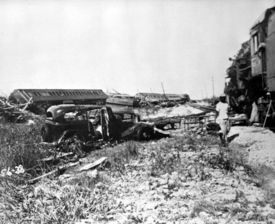Overseas Railroad
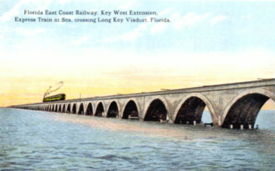
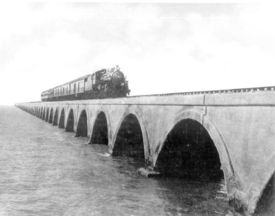
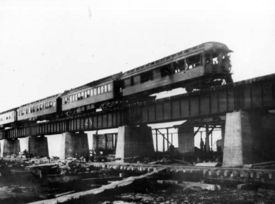
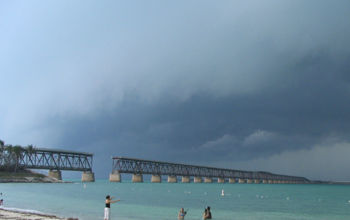
Overseas Railroad (also known as Florida Overseas Railroad) was the extension of the Florida East Coast Railway to Key West, a city of almost 20,000 inhabitants located 128 miles beyond the end of the Florida peninsula. It operated from 1912 to 1935.
Contents
Henry Flagler: Florida's east coast
Henry Morrison Flagler (1830-1913), was a principal in Rockefeller, Andrews & Flagler and later, Standard Oil during the Gilded Age in the United States. The wealthy man took interest in Florida while seeking a warmer climate for his ailing first wife in the late 1870s. Returning to Florida in 1881, he became the builder and developer of resort hotels and railroads along the east coast of Florida.
Beginning with St. Augustine, he moved progressively south. Flagler helped develop Ormond Beach, Daytona Beach, Palm Beach, and became known as the Father of Miami, Florida.
Flagler's rail network became known as the Florida East Coast Railway (FEC). By 1904, the FEC had reached Homestead, south of Miami.
Key West Extension: Eighth Wonder of the World
After the United States announced in 1905 the construction of the Panama Canal, Flagler became particularly interested in linking Key West to the mainland. Key West, the United States' closest deep-water port to the Canal, could not only take advantage of Cuban and Latin America trade, but the opening of the Canal would allow significant trade possibilities with the west.
Initially called "Flagler's Folly", the construction of the overseas railroad required many engineering innovations as well as vast amounts of labor and monetary resources. At one time during construction, four thousand men were employed. During the seven year construction, five hurricanes threatened to halt the project. Costs were estimated at between $20 million and $40 million.
Despite the hardships, the final link of the Florida East Coast Railway was completed in 1912. In that year, a proud Henry Flagler rode the first train into Key West aboard his private railcar "Rambler", marking the completion of the railroad's overseas connection to Key West and the linkage by railway of the entire east coast of Florida. It was widely known as the "Eighth Wonder of the World".
Demise
The portion of the Overseas Railroad in the Middle Keys was heavily damaged and partially destroyed in the Labor Day Hurricane of 1935, a Category 5 hurricane which is often called "The Storm of the Century". The September 2, 1935 storm killed between 400 and 700 people and devastated Long Key and adjacent areas. The FEC's Long Key Fishing Camp was destroyed, as was a FEC rescue train which became swamped at Islamorada.
The Florida East Coast Railway was financially unable to rebuild the destroyed sections, so the roadbed and remaining bridges were sold to the State of Florida, which built the Overseas Highway to Key West, using much of the remaining railway infrastructure. Rebuilt in the 1980s, following Flagler's dream, the Overseas Highway (U.S. Route 1) continues to provide a highway link to Key West, ending at the buoy which marks the southernmost point in the continental United States. Many old concrete bridges of the Overseas Railroad remain in use as fishing piers.
See also
References
- Standiford, Les (2002). Last train to Paradise. Crown Publishers, New York, NY. ISBN 0-609-60748-0.
External links
- Overseas Railroad at railfan.net
- Florida East Coast Railway Website
- Flagler Museum - History of the Florida East Coast Railway
- Florida East Coast Railway Society
- Florida Photographic Collection has many photos
